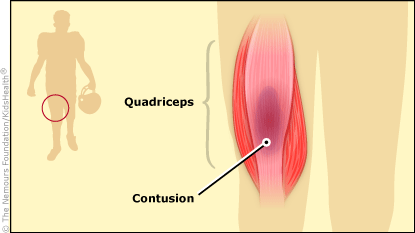Quadriceps Contusion
What Is a Quadriceps Contusion?
A quadriceps contusion is an injury to the quadriceps. This group of four muscles is at the front of the thigh. They help you straighten your knee and flex (bend) your hip. They're important for many movements, including walking and running.
With rest and proper treatment, most people get better from a quadriceps contusion within a few weeks.
What Are the Signs & Symptoms of a Quadriceps Contusion?
All quadriceps contusions cause thigh pain. Other signs and symptoms depend on how severe the contusion is, but can include:
- tenderness
- bruising
- swelling
- a bump in the thigh
- trouble bending the knee
- trouble flexing the hip
- trouble walking
What Causes Quadriceps Contusions?
A quadriceps contusion happens when someone gets hit very hard in the thigh. The force makes the muscle tear and bleed. It also can tear the sheath that covers the quadriceps muscles.

Most quadriceps contusions happen from playing sports. For example, it can happen:
- when someone gets hit in the thigh with a ball, helmet, or another player during football or lacrosse
- in sports like skateboarding, skiing, and snowboarding, when someone falls and hits their thigh on a tree or other hard object
How Are Quadriceps Contusions Diagnosed?
Doctors diagnose a quadriceps contusion by asking about the injury and the person's symptoms, and doing an exam.
Usually no testing is needed. If the injury is serious or doesn't get better after treatment for a few weeks, the doctor may order an MRI scan. This lets them get a closer look at the contusion and check for other injuries.
How Are Quadriceps Contusions Treated?
With rest and proper treatment, most quadriceps contusions heal on their own within a few weeks.
To help with symptoms while it heals:
- Rest the area and avoid activities that cause pain. Use crutches if your doctor recommends them.
- For the first day or two, put an ice pack on the area 3–4 times a day for 15 minutes at a time. Put a towel between the ice and the skin to protect it from the cold.
- Use an elastic wrap to help support the quadriceps and keep swelling down.
- Take medicine for pain, such as ibuprofen (Advil, Motrin, or store brand) or acetaminophen (Tylenol or store brand). Follow the directions that come with the medicine for how much to take and how often.
It also helps to raise the thigh:
- When sitting, bend the knee slightly and prop it up on pillows.
- When lying down, put pillows under your hips to lift them and your thigh.
Do not put heat on the contusion. This can make swelling worse. Also, do not massage the area without talking to your doctor first.
When the doctor says it's OK, you can do muscle strengthening and stretching through physical therapy (PT) or an at-home exercise program.
Most people heal from a quadriceps contusion within a few weeks. Rarely, some need surgery if the contusion is very severe or doesn't get better with treatment.
When Can I Return to Sports?
You can go back to sports when you are completely pain-free or the doctor cleared you to start playing again.
What Else Should I Know?
In a few cases, a quadriceps contusion can lead to other problems, including:
- Compartment syndrome: This is when blood builds up inside the muscle sheath in the days after the injury. It needs treatment right away to prevent permanent muscle damage.
- Myositis ossificans: This is a hardening, or calcification, of the muscle. It can happen several weeks after the injury and is more likely if the contusion wasn't treated.
When Should I Call the Doctor?
These problems do not happen often, but call your doctor right away if you have:
- pain that's even worse than the pain you had when you were injured
- tingling or burning in the injury area
Can I Prevent Another Quadriceps Contusion?
It can be hard to prevent a quadriceps contusion because they happen suddenly and often without warning. But you can make one less likely by following safety guidelines while playing sports:
- Wear protective gear that fits well. For example, wear thigh pads for hockey and football.
- Know the rules of your sport and follow them. In a football game, you wouldn't want someone to ram his helmet into your thigh, so make sure you don't do it to another player.
- With skiing, snowboarding, and skateboarding, know your limits. Always stay under control and follow all posted signs to lower the risk of falling or running into a railing, park feature, or tree.
Reviewed by: Amy W. Anzilotti, MD
Date Reviewed: Nov 25, 2019
















